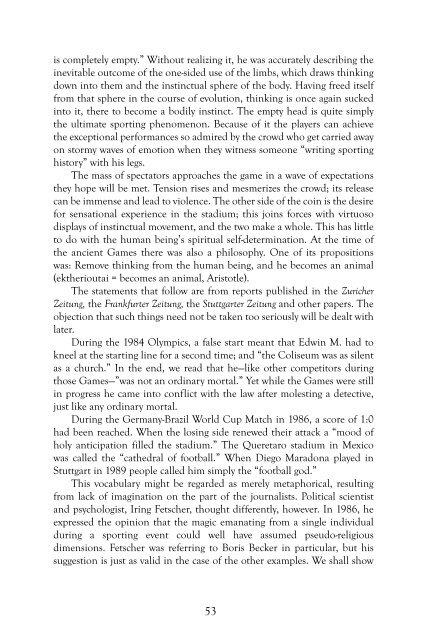When Healing Becomes Educating, Vol. 6 - Waldorf Research Institute
When Healing Becomes Educating, Vol. 6 - Waldorf Research Institute
When Healing Becomes Educating, Vol. 6 - Waldorf Research Institute
Create successful ePaper yourself
Turn your PDF publications into a flip-book with our unique Google optimized e-Paper software.
is completely empty.” Without realizing it, he was accurately describing the<br />
inevitable outcome of the one-sided use of the limbs, which draws thinking<br />
down into them and the instinctual sphere of the body. Having freed itself<br />
from that sphere in the course of evolution, thinking is once again sucked<br />
into it, there to become a bodily instinct. The empty head is quite simply<br />
the ultimate sporting phenomenon. Because of it the players can achieve<br />
the exceptional performances so admired by the crowd who get carried away<br />
on stormy waves of emotion when they witness someone “writing sporting<br />
history” with his legs.<br />
The mass of spectators approaches the game in a wave of expectations<br />
they hope will be met. Tension rises and mesmerizes the crowd; its release<br />
can be immense and lead to violence. The other side of the coin is the desire<br />
for sensational experience in the stadium; this joins forces with virtuoso<br />
displays of instinctual movement, and the two make a whole. This has little<br />
to do with the human being’s spiritual self-determination. At the time of<br />
the ancient Games there was also a philosophy. One of its propositions<br />
was: Remove thinking from the human being, and he becomes an animal<br />
(ektherioutai = becomes an animal, Aristotle).<br />
The statements that follow are from reports published in the Zuricher<br />
Zeitung, the Frankfurter Zeitung, the Stuttgarter Zeitung and other papers. The<br />
objection that such things need not be taken too seriously will be dealt with<br />
later.<br />
During the 1984 Olympics, a false start meant that Edwin M. had to<br />
kneel at the starting line for a second time; and “the Coliseum was as silent<br />
as a church.” In the end, we read that he—like other competitors during<br />
those Games—”was not an ordinary mortal.” Yet while the Games were still<br />
in progress he came into conflict with the law after molesting a detective,<br />
just like any ordinary mortal.<br />
During the Germany-Brazil World Cup Match in 1986, a score of 1:0<br />
had been reached. <strong>When</strong> the losing side renewed their attack a “mood of<br />
holy anticipation filled the stadium.” The Queretaro stadium in Mexico<br />
was called the “cathedral of football.” <strong>When</strong> Diego Maradona played in<br />
Stuttgart in 1989 people called him simply the “football god.”<br />
This vocabulary might be regarded as merely metaphorical, resulting<br />
from lack of imagination on the part of the journalists. Political scientist<br />
and psychologist, Iring Fetscher, thought differently, however. In 1986, he<br />
expressed the opinion that the magic emanating from a single individual<br />
during a sporting event could well have assumed pseudo-religious<br />
dimensions. Fetscher was referring to Boris Becker in particular, but his<br />
suggestion is just as valid in the case of the other examples. We shall show<br />
53

















